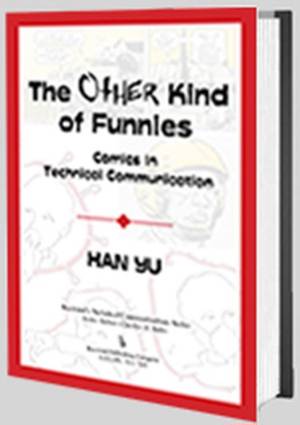
Je cadeautjes zeker op tijd in huis hebben voor de feestdagen? Kom langs in onze winkels en vind het perfecte geschenk!
- Afhalen na 1 uur in een winkel met voorraad
- Gratis thuislevering in België vanaf € 30
- Ruim aanbod met 7 miljoen producten
Je cadeautjes zeker op tijd in huis hebben voor de feestdagen? Kom langs in onze winkels en vind het perfecte geschenk!
- Afhalen na 1 uur in een winkel met voorraad
- Gratis thuislevering in België vanaf € 30
- Ruim aanbod met 7 miljoen producten
Zoeken
Omschrijving
The Other Kind of Funnies refutes the mainstream American cultural assumption that comics have little to do with technical communication-that the former are entertaining (in a low-brow sense) and juvenile, whereas the latter is practical and serious (to the point of stuffiness). The first of its kind, this book demonstrates the exciting possibilities of using comics in technical communication. It defines comics as a medium and art form that includes cartoons, comic strips, comic books, and graphic novels; provides conceptual and historical backgrounds on comics; and discusses the appeals and challenges of using comics-style technical communication. More specifically, it examines comics-style instructions, educational materials, health/risk communication, and political/propaganda communication. The author argues that comics-style technical communication encourages reader participation, produces covert persuasion, facilitates intercultural communication, benefits underprivileged audiences such as children and readers of lower literacy, and challenges the positivist view of technical communication. An abundance of comics-style technical communication examples, carefully selected from across cultures and times, demonstrates the argument. While the book proposes that comics can create user-friendly, visually oriented, engaging, and socially responsible technical communication, it is also quick to acknowledge the limitations and challenges of comics-style technical communication and provides heuristics on how to cope with them. The Other Kind of Funnies is unique in its interdisciplinary approach. It focuses on technical communication but speaks to design, cultural and intercultural studies, historical studies, and to some extent, education, politics, and art.
Specificaties
Betrokkenen
- Auteur(s):
- Uitgeverij:
Inhoud
- Aantal bladzijden:
- 280
- Taal:
- Engels
- Reeks:
Eigenschappen
- Productcode (EAN):
- 9780895038401
- Verschijningsdatum:
- 30/10/2015
- Uitvoering:
- Paperback
- Formaat:
- Trade paperback (VS)
- Afmetingen:
- 152 mm x 229 mm
- Gewicht:
- 376 g

Alleen bij Standaard Boekhandel
+ 351 punten op je klantenkaart van Standaard Boekhandel
Beoordelingen
We publiceren alleen reviews die voldoen aan de voorwaarden voor reviews. Bekijk onze voorwaarden voor reviews.









